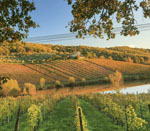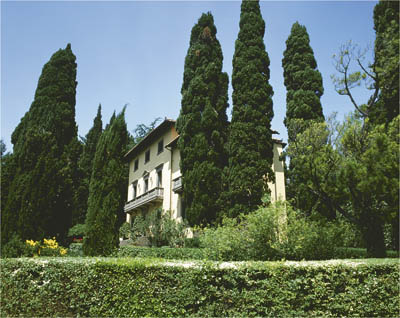Country Life International: Properties with vineyards
Demand for Italian and French vineyards is growing, says Anna Tyzack


Exquisite houses, the beauty of Nature, and how to get the most from your life, straight to your inbox.
You are now subscribed
Your newsletter sign-up was successful
The ‘boutique' wine estate-an immaculately restored château or villa overlooking its own award-winning vineyard-is replacing the super-yacht as the ultimate status symbol.
Along with celebrity viticulturists such as Brad Pitt and Angelina Jolie, who produce Côtes de Provence Rosé from their Château Miraval in Provence, and Sting, who makes wines including When We Dance and Sister Moon at his Il Palagio estate in Tuscany, serious investors from Russia, the Far East and South America are purchasing wineries in France and Italy. ‘They want the whole package: a wonderful house with plenty of accommodation, a pool and garden, as well as vineyards capable of making a commercially successful wine, even if it's on a small scale,' notes Jelena Cvjetkovic of Savills.
Such is the demand for estates in the best wine-growing areas that the prices have climbed as high as €1 million per hectare (2.47 acres) in France and €700,000 per hectare in Italy. ‘It's a prestige purchase for many buyers. They want to own precious vineyards and try their hand at making good wine,' explains Michael Baynes of Maxwell-Storrie-Baynes, who's the Bordeaux representative of Christie's International Real Estate's new vineyard-acquisition service. ‘But it's also an attractive, healthy lifestyle choice that adds another dimension to foreign home ownership.'
Most vineyard buyers have their sights set on a specific region of France or Italy, according to Rupert Fawcett of Knight Frank. ‘It's an emotional decision based on their love of the particular area and its wine.' For example, François Faverot de Kerbrech, who bought and restored the 17-acre Dom-aine Faverot winery in the Luberon, took four years to find his estate. ‘I particularly wanted Syrah and Grenache grapes. You've got to be passionate about wine-making as it isn't for the faint hearted.'
Many of the potential buyers are successful entrepreneurs, industrialists or businessmen, who regard their vineyard as a quasi-commercial lifestyle investment. ‘If you've been successful in your career, there's no reason why you won't make a success of a winery,' comments Jonathan Gray of Beau-champ Estates in Cannes, who sold Château Miraval to Mr Pitt and Miss Jolie for £35 million.
It's essential to buy a recognised vineyard, advises Wanda Djebbar, who runs Toscana Restoration, a company that restores and manages properties in the Montalcino area of Tuscany. The labels AOC in France and DOC, DOCG and IGT in Italy indicate that the grape varieties and winemaking practices are approved. ‘It'll be worth it in terms of investment as they will always hold their value,' she asserts.
According to Trevor Leggett of the French estate agency Leggett Immobilier, a surprising amount of wine can be made from just a few acres. ‘Go for quality over quantity as it costs €2 to €3 to make a bottle of wine whether you're able to sell it for €5 or €85.' Consult specialist winery agents such as Mr Baynes and Stefano Sabini of Sabini & Associates, who will research the business history and track record of estates, and study the quality of the soil, the terrain and the exposure. ‘All these things affect the price you should pay,' explains Mr Sabini. ‘We give advice from business, tax and legal perspectives.'
Exquisite houses, the beauty of Nature, and how to get the most from your life, straight to your inbox.
The most prestigious estates are often sold with an experienced management team in place, but some buyers prefer to entrust their vines to a local co-operative or farmer in return for a certain amount of wine each year. ‘You won't make any money, but you can live the wine-producing dream without any of the hassle,' says Miss Cvjetkovic.
Those keen to run a vineyard are advised to take on no more than about 12 acres, unless they can afford staff, according to Miss Djebbar, who makes her own wine in Montalcino. ‘There are times when you will be completely flat out in the vineyards or in the office, working on your marketing campaign-it's a big job getting your wine on tasting shelves.'
Paul Rowbotham and his wife, Kirstie, who bought Château La Tour de Chollet near Bordeaux in 2006, have spent the past seven years overhauling the vineyards and now produce high-quality organic wine. ‘It's non-stop action from January to the time we harvest the grapes and bottle the wine, but my children are growing up in a beautiful place with more space than we could ever afford to own in Britain,' says Mr Rowbotham, who worked at a winery for a year before taking on his château.
In terms of quality of life, it's hard to imagine a more pleasant return on your money, says Miss Djebbar, but she warns against rushing into a purchase. ‘You've got to work out whether it's what you want in the long run, as it's not easy to jump in and out of, and it can take several years to start making a profit.' But Mr Faverot de Kerbrech, who spends much of the year tying up and trimming vines, and fretting about frost, pests and disease, insists that, although a niche investment, a winery is always going to be somebody's dream. ‘You live a wonderful lifestyle in a delightful climate and you drink very well-assuming your wine is any good.'

France
Grand Cru Classé vineyards in Bordeaux have long been on the radar of the world's wealthiest investors, but since Chinese buyers arrived on the scene a couple of years ago, prices have risen from €7,500-€15,000 per hectare to up to €600,000, with pockets of Saint-Émilion selling for more than €1 million per hectare.
Last year, of the 37 vineyard châteaux sold, more than 60% went to Chinese buyers, according to the French rural land development organisation Safer, including Château Bellefont-Belcier, a leading Grand Cru Classé estate, for about €35 million. Northern Europeans, Americans and Russ-ians are also fighting over wineries in prestigious AOCs such as Saint-Estève, Pomerol and Médoc, according to Mr Leggett. ‘I witnessed a Chinese and a German buyer competing over an average farmhouse with two hectares of Grand Cru vineyards and some stock, only to be gazumped by another Chinese buyer.'
Grand Cru Classé wineries tend to sell discreetly off-market, but more affordable wineries currently for sale in the area include a restored château with 20 acres of quality Premières Côtes de Bordeaux vineyards at €4.2 million (00 33 5 57 84 08 82; www.maxwellstorriebaynes.com). ‘It's one of the best-presented Bordeaux châteaux under €10 million,' Mr Baynes says.
For those looking to invest outside the Bordeaux region, the Var is the next big thing, according to Mr Gray. ‘The wine isn't as famous, but the climate and the lifestyle are favourable.' So far, Mr Gray has witnessed demand from a handful of Chinese investors, but he expects them to arrive in numbers soon.
North-west of the Var, in the Vaucluse, Mr Faverot de Kerbrech is seeking €2.495 million for his Domaine Faverot, which has views of Mont Ventoux and comes complete with the label he created from scratch (Knight Frank, 020-7861 1058; www.knightfrank.co.uk). ‘The saying goes as regards wineries that, to make a small fortune, you have to start with a big fortune, but we make enough to drive a nice car and go on holidays. It's the most pleasurable form of hard work I've ever encountered.'
Italy
Although a few buyers are attracted to up-and-coming winemaking areas such as Sardinia and Umbria, or to the more established Piedmont-famous for its Barolo wines-the majority of those buying boutique vineyards are looking to Tuscany, according to Lynne Davie of Beauchamp Estates. The region produces some of the world's most famous wines, including Chianti Classico, Vino Nobile di Montepulciano and Brunello di Montalcino.
Mr Sabini says he's receiving up to 15 enquiries every month for wineries in Tuscany from American, Russian, South African and Chinese buyers. ‘They're largely businessmen who are passionate about the countryside and want to own something that will remain in their family.'
Prices for wineries in renowned producing areas between Florence and Siena start at €1.5 million and reach €30 million-€40 million. The most coveted are Brunello vineyards, which can sell for between €400,000 and €700,000 per hectare and rarely appear on the open market. But investors, particularly Russians, are also drawn to the coastal vineyards in DOC Bolgheri, producing Super Tuscan wines.
Not all buyers have grand ambitions for their vineyards, preferring to produce wine simply for their own consumption. Sus-annah Chancellor has enjoyed drinking wine made on her country estate-which she's now put onto the market for €2.5 million (see facing page)-between Arezzo and Siena for several decades, without ever attempting to make a profit from it.
‘It's very good fun and gives us something productive to do out here. We regard the vineyards as an extension of the garden,' she says.
* Follow Country Life property on Twitter
Read more at http://www.countrylife.co.uk/article/531584/Protect-the-view-from-your-house.html#GxVg0aTp6LiYuI12.99
Country Life is unlike any other magazine: the only glossy weekly on the newsstand and the only magazine that has been guest-edited by His Majesty The King not once, but twice. It is a celebration of modern rural life and all its diverse joys and pleasures — that was first published in Queen Victoria's Diamond Jubilee year. Our eclectic mixture of witty and informative content — from the most up-to-date property news and commentary and a coveted glimpse inside some of the UK's best houses and gardens, to gardening, the arts and interior design, written by experts in their field — still cannot be found in print or online, anywhere else.

